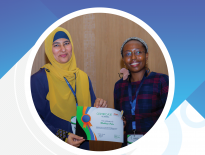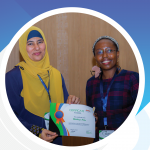Wandi stood in front of the mirror in her mother’s bedroom. She gazed at her reflection and admired how the beautiful dress she wore looked on her. She had received the dress as a present for passing her grade seven examinations. Her sister Mary, who lived in the United States, sent her the dress. She was happy at how it looked on her.
“Everyone in the village will be looking at me,” she thought to herself. The dress was beautiful, short and revealing.
“I look like Rihanna,” she said to herself.
As she stepped out of the house, all eyes flew to her. Her father immediately looked down in shame. Her mother dropped the pot she held in her hands. Everyone was shocked by what they were seeing.
“Why are you dressed like that?” asked her mother angrily.
“Oh, you mean my beautiful dress?” she said. “Mary sent it to me as a present.”
“That is an ugly dress!” shouted her mother.
“Why mother?”
“It does not reflect our culture!”
“What has this dress got to do with our culture?” Wandi asked. “Is there a type of dress we should wear in our culture?”
“Yes, in our African culture,” began her mother, “we wear long dresses that are not revealing.”
“Mama, our culture is a dark culture,” she said, “our culture is too backward.”
“Our culture is not dark,” came the response. “Our culture reveals the uprightness of our society.”
“Our culture is bad,” she stated, “I hate our dark culture.”
“Go back inside and put on a chitenge,” her mother commanded.
“I don’t want to put on a chitenge,” she protested. “I don’t want to look old like all the other girls.”
She ran out of her mother’s compound. She was not going to go to the party wearing a chitenge dress. She wanted to look like Rihanna. She ran fast to the road that led to the village square where the party was going to be held.
As she walked on, an old woman approached her. The woman looked at her from head to toe and then asked, “What are you wearing?”
“You like it?” Wandi asked.
“No,” said the old woman. “You are almost naked.”
“Mind your own business, old woman,” Wandi said.
“I am your grandmother,” the old woman said, “and I am concerned about your dressing.”
“You are not my grandmother,” Wandi responded harshly.
“Every old woman in our culture is your grandmother and every man or woman is your father and mother,” said the old woman.
“It’s a terrible culture,” she said, “a dark culture.”
“Put on this chitenge instead,” said the woman as she handed over her chitenge.
“No thanks,” Wandi responded, “it’s my right to wear what I feel I should wear.”
Wandi turned her back to the old woman and was determined to walk fast and uninterrupted to the village square. She ignored whatever the woman was saying. She did not like her African culture. She felt it was a dark culture; one which was filled with restrictions.
As she took her second step forward, she heard a rumbling noise. She thought it was going to rain soon. She thought that if she picked up her pace, she could outrun the rain.
She blinked her eyes once and when she opened them again, the whole world had gone pitch black. Everywhere she looked was dark. She could not see a single thing. She believed she was blind.
Terrified, she started crying. She could not see which way to go. She could not see the way to her home or to the village square. As she felt the heavy rain drop, she cried harder in despair.
“Please help me,” she cried.
“No, I can’t help you,” said an old man passing by. “You are not dressed.”
The rain came down heavily and incessantly. She was soaked. She didn’t know which way to go. She got down on her knees and asked for forgiveness.
“Can I give you the chitenge now?” asked the old woman.
“Yes, grandmother,” Wandi responded. “I am so sorry about what I said.”
“Let me take you home, my child,” the old woman said as she lifted Wandi up.
When Wandi wore the chitenge she felt the lingering warmth from the old woman seep through her once beautiful now drenched dress, and her eyesight was restored. She could see again. Truly see.
Read: African Technology – A Children’s Story by Seluliwe Masuku, Eswatini
Read – The Tele-Doctor – A Children’s Story by Moses Tololo, Zambia
——-
The Writers Space Africa(WSA) Magazine is published by a team of professionals and downloadable for free. If you would like to support our work, please buy us coffee – https://www.buymeacoffee.com/wsamagazine







